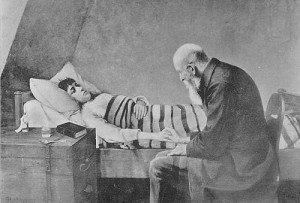 Another reflection or two based on Stanley Hauerwas’ latest book, “Approaching the End: Eschatological Reflections on Church, Politics, and Life.”
Another reflection or two based on Stanley Hauerwas’ latest book, “Approaching the End: Eschatological Reflections on Church, Politics, and Life.”
One of Hauerwas’ favorite lines goes something like this: “Being a Christian means undergoing the training necessary to know how to live out of control.” We do live under the illusions that we are mostly in control of what happens to us and around us. Especially here in the United States, we like to think that very little is out of our control. And, that flies in the face of our Christian theology, yes? We follow a Lord who gave up all control, who put on the shelf every bit of status and power, who emptied himself of all mastery and prayed, “Not my will, but yours be done.”
And he taught us to pray and to live in that same way.
Hauerwas makes the point in one of the last essays in this latest collection that sickness is one way God trains us to rely on him.
Because of the staggering advances in technology and modern medicine, our approach to sickness sometimes betrays an attitude about sickness that might be close to the same attitude non-Christians have about sickness. (Go ahead and read that sentence again if you need to. Sorry.) Sometimes the God we pray to when we are sick is only a “god of the gaps.” He’s the “middle-man” between us and the doctors and experts, the MRIs and CT Scans, that do the real job of healing. Praying to God that way makes him to be a deistic God whose existence is not much more than an insurance policy for us against disaster. But a god like that is not the God who came to us in the flesh and suffered with us in pain and death.
The God we worship taught us to pray, “Not my will, but yours be done.” We’re all going to get sick. We’re all going to suffer in this life. We’re all going to get hurt, to get disappointed, to get injured, and die. But those are not the kinds of things that fuel our prayers. Our prayers should be motivated by the eternal and right-now presence of God. Hauerwas writes:
“The story that determines the Christian body is the story of Emmanuel, God with us. This is the story we were baptized into, which means we have already died. Therefore, the hope we share is ultimately not a hope to get through life unscathed, but a hope to remain faithful until the end. It is the hope of the resurrection.”
“Illness usually comes as an unexpected guest, threatening to disorder our routines and make our lives incoherent. The stories that constitute our lives are meant to give us a sense of control and to assure us that we know where we are and in what time we live. Yet the stories that we may actually be living may not be the ones we think we are living, but our illusions are dear to us. Illness often destroys our illusions as well as our confidence that we are in control.”
When we get sick, we realize that we are not in control. We acknowledge that God is in control and we lean on him more. We depend on God to sustain us, to give us life, to bless us with breath. When we’re sick, we need God. We recognize our powerlessness and our inabilities to fix the situation. We’re reminded that we are out of control and that we really, really need God.
And isn’t that where God wants you?
Peace,
Allan
Leave a Reply